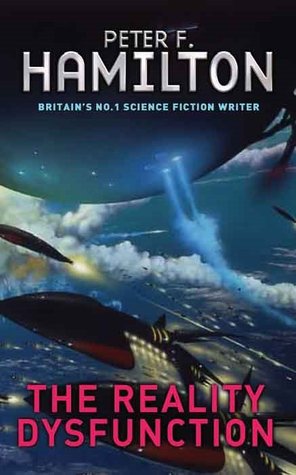The Reality Dysfunction
Book One of the Night’s Dawn trilogy

It’s a shame that my last book of 2013 has been such a disappointment; a qualified one, mind you, but a disappointment none the less.
I’ve picked up and looked at Peter F. Hamilton’s 1996 novel, The Reality Dysfunction several times over the last year. I’m not familiar with Hamilton’s writing but it has that great title and that really great cover. It’s also 1200 pages long, but that wasn’t what put me off: it was, paradoxically, the great cover I mentioned. With battling, exploding Trek-like starships against the background of deep space and massive planets I figured that it was a hard-core space-opera– and I would have to be in the mood for that. I think that the last time I read a hard S.F. trilogy was Asimov’s Foundation, and that was neither today nor yesterday.
A month ago I settled down with it. Now, I’m one of those people that have to see the images in a novel very clearly in my head. Sometimes I’m even editing my own film as I go along; and the first thing about Hamilton is that he’s never very clear in his description. In fact, with one of his alien races, it was a while before the penny dropped that they were aliens. What he does do is throw a lot of information at you as to size, length and weight, all of which often seems to amount to nothing tangible. And since I’m a dinosaur who still thinks in feet and inches it was getting irritating to keep converting what he was on about as he’s using metric.
What a damned relief it was when we landed on the planet of Norfolk, an anti-tech civilisation that still holds with the sensible idea of measuring in good old-fashioned miles.
But I’m getting ahead of myself. The Reality Dysfunction is set in the 27th Century during a period when humans have spread out into, and colonised, the known universe. In the course of this they have encountered three alien races, none of whom pose a threat (even though one at least is very advanced) which is just as well since—human beings still being as rotten and warlike as they ever were—are more than capable of finding something to fight amongst themselves about. In fact in that regard (and in sexual matters, which we’ll come to later) they don’t seem to have advanced at all except in how to kill even more people. There are still admirals and warships, marines and mercenaries. With the nanonics that they are able to implant in their own bodies they are just more efficient at bloodshed, that’s all.
Several story lines are introduced. One that we are given early on involves Satanists, so there went my idea that this was going to be hard S.F.; and to cut a very long story short it’s not long before the returned souls of the dead are threatening civilisation as we know it, Jim.
The humans have over the centuries broken off into two strands: the Adamists and the Edenists. The latter have discovered how to implant an ‘affinity gene’ which almost seems to make them transcend—or perhaps ‘accentuate’ is a better word—their humanity. They grow habitats on which they live and into which they can transfer their personalities when they die. Some are even in charge of sentient starships with which they share a bond. They exchange mental conversations with these vessels, which rather snootily look down on the mechanical ships of the Adamists, those who disapprove of the affinity gene. In fact the split between the two has come about, as far as I could make out, because the Church of Rome has excommunicated those who have taken up Edenism.
Gay Readers, Look Away!
Yep, Satanism and the proclamations of the Vatican all get a look in early, which had me continuing with extreme caution, as you can imagine. Still, at least it gave Rome and Islam something to agree on for a change, so that can’t be a bad thing.
The Adamists, however, do have this handy thing called ‘geneering’ which allows them to remove the bits of themselves and their descendants-to-be that they don’t like. Naturally, the Vatican looks on this particular bit of science with enormous approval since it allows them to remove the ‘gay gene’.
But despair ye not, gay readers! There is a place for you deviants in this grand plan! After all, many of the Satanists are gay or bisexual. Rapists, mind you, but still. Actually, in this Brave New World Hamilton might as well have just written at the beginning of the book:
Heterosexuals = Good.
Homosexuals = Bad.
The character of one of these main story strands is Joshua Calvert, who I feel we are supposed to find an admirable character; and I suppose that he is in his way, but I never warmed to this guy at all. He is obviously the man that other men want to be and women want to be with, but I’ll take Russell Crowe’s character in Gladiator to fulfil that role any day– the be part anyway. Joshua comes across to me as something of a smirking git who basically uses women as a receptacle for his jizm, and if an innocent young girl like Louise of Norfolk gets her feelings hurt in the process that’s just tough luck. Sure, when did telling a few porkies like ‘I love you’ ever have to stand in the way of taking a virginity?
Actually, just remembering Joshua is irritating me. This guy is like some sort of futuristic James Bond: he can get out of any scrape you put him in and women of all ages throw their panties into the corner as soon as he walks into the room, roguish grin and all. I can’t recall if Hamilton ever describes his cute dimples when he smiles but I’ll bet that we’re meant to imagine them. If it comes to that, one of the frigging living starships has a bit of a crush on him. Even that other legendary Outer Space Swordsman James T. Kirk never managed that one, and that guy must have slept with every species in the galaxy. I’m convinced that Dr. McCoy must have spent half his time curing Kirk’s latest Space STD.
I wish that Hamilton had put as much effort into making his fictional planets (sort of) real. Norfolk never comes alive. Nor, incredibly, does the water planet of Atlantis, which is a great concept, albeit one already used in Solaris. Oh yeah, and Waterworld. Kind of. Then again he doesn’t seem to mind picking from other fiction as he goes along. For instance, the mating flights of the sentient starships are so obviously ripped out of Anne McCaffrey’s Dragons of Pern series that you can only shake your head at how he got away with it.
Apocalypse Soon
Every one of these enlightened humans is obsessed with sex. I mean, they are obsessed with it! I kept wondering how any of the human race actually got around to the boring, mundane aspects of inventing something, let alone learn how to use this incredible technology. And while I’m on the subject, the amount of sexual violence in the first half of the book is startling to say the least. Thankfully Hamilton doesn’t go into too much detail; it’s left to your imagination, which is worse. Less thankfully is that he does go into detail during some passages of straight sex. Again, I wish that he hadn’t. I can’t be bothered to look for one of the offending sections but I’m pretty sure that at one point he talks of proudly erect nipples.
Now I’m not against proudly erect nipples per se but it was a crap image when it was first used about 500 years ago and it’s still a crap image today. I’m only surprised that he didn’t use that other old stalwart: “His eyes slid down the front of her dress.” That one always makes me smile.
Another major story running is that taking place amongst the fighting marines on the jungle planet of Lalonde. This is Vietnam with bigger weapons. In fact it’s even made explicit at one point:
“Edmund Rigby had planted the germs of insurgency in every city across the planet’s islands, cabals of possessed who were already annexing the populace. A captain of the Australian Marines, he had died from a landmine explosion in Vietnam in 1971; but he had studied military tactics, had even been sent to the Royal Naval College in Dartmouth for officer training. And this vast space empire of Confederated planets, for all its awesome technology, was no different to the Earth upon which he had once walked. Vietcong insurgency tactics from the past were just as applicable now…”
So there you have it: whilst you’re still reeling from a surfeit of The Exorcist, Ghosts of Mars, any Mills and Boone novel, any soft-core porn novel, Space-Opera, Dragonflight and James Bond in Space, you are suddenly hit with Apocalypse Now.
And to be fair, a lot of this stuff is good. It must be; this is the first part of a trilogy as well as a collection of short stories and a guide to the entire Confederation Universe. It has an awful lot of readers and even many who are completely immersed in the mythology.
For myself, though, 1200 pages were more than enough. I guess that my life will have to remain unfulfilled because I definitely won’t be returning to find out what happens in the next volume. Joshua Calvert and his sex drive will just have to get along without me, erect nipples and all.


Recent Comments